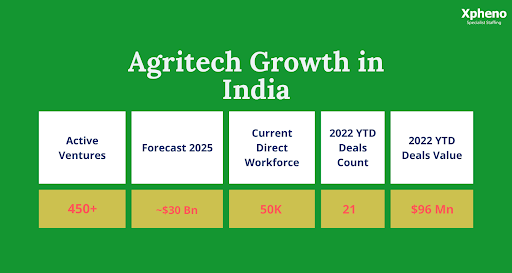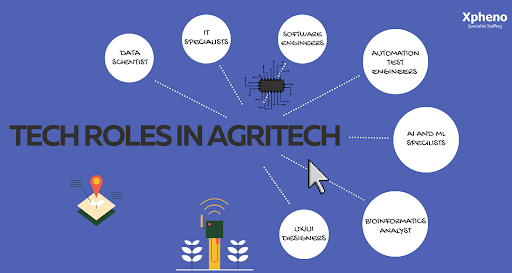Hiring in Agritech: Job creation for top tech talent and local communicators in India
Innovations in the Indian startup space are transforming agricultural processes for better efficiency and accessibility. Agritech enterprises build products and offer services that are empowering the agriculture sector with technology. Consequently, with the second largest agriculture output globally, the Indian agriculture sector is bound to see tremendous growth in the next few decades.
The focus is on enhancing productivity, efficiency, and sustainability by bringing technology into the value chain across inputs. Enterprises are targeting farmers, traders, FPOs, and the entire distribution engine to improve yield as well as the processes of harvesting, storage, transportation and distribution. With technology at the core of the business, agritech ventures are transforming unorganized spaces that were extensively occupied by middlemen.
The agritech startup ecosystem is fostering scalable and sustainable solutions using IoT, big data, cloud computing, and other emerging technologies. Likewise, the agritech sector has an ever-increasing demand for tech and non-tech talent. The workforce demands in agritech ventures is a challenge that may require seasonal and strategic solutions.
In this post, we investigate how top agritech ventures target and hire the best talent.
We dissect:
- The Agritech boom
- Subclusters in Agritech
- Agritech roles and how to hire
- Tech roles in Agritech
- How to access top tech talent
- Non-Tech roles in Agritech
- How to access expert local communicators
The Agritech boom
The most essential and foundational sector of the Indian economy, the agricultural sector, contributes about 17-18% of India’s GDP. However, the pressure on the agriculture sector to feed the projected growth of the Indian population with the limited land resources is staggering. It’s evident that the traditional models won’t suffice to feed the demand from the agricultural sector in India.
At the same time, 70% of Indian households depend on agriculture for livelihood. And the people employed in the agriculture sector in India are extremely vulnerable due to risks involved at every stage of the inefficient farming processes.
Operational inefficiencies plague the Indian agriculture sector. However, agritech startups are helping to make farming more sustainable and profitable in India. According to a NASSCOM report, India now has over 450 agritech startups growing at the rate of 25% year on year.
The growth of this sector is evident from Xpheno’s research on the FEALD enterprises. In 2022, from April 1st (starting of the fiscal) till now, the Agritech sector has had 21 deals worth 96Mn$. Comparing this to the total deals in 2021, a total of 265Mn$ from 23 deals, it’s a great improvement. Although still a young member of the FEALD cohort, it has 450+ active ventures, and 5 of them have passed the seed funding stage in 2022.
These Indian agritech ventures are focused mainly on using the unorganized data that, for the most part, was being generated and utilized by the government. Consequently, it has created a massive direct and indirect employment opportunity with a 30Bn$ market potential by 2025.
Agritech Hiring
In the transformed marketplace, agritech ventures are thriving with much-needed solutions. Post pandemic, the logistics and transport chains and farmers’ access to marketplaces were disrupted. Agritech enterprises are helping provide farmers access to credit, data, and advisory.
However, as the agritech space incorporates financial services, logistics, and introduces technology-enabled smart techniques, the search for tech and non-tech talent becomes even tougher.
For agile mass adoption, agritech ventures need to have farmer-friendly user interfaces and engage individuals who can onboard farmers to use their services and products for routine agricultural practices.
Sub-clusters in Agritech
These agritech ventures can be divided into a few clusters of startups that have similar business models. Let’s examine these buckets before we move on to discuss the hiring needs of agritech businesses.
Farm to business ventures
Farm-to-business ventures help organize the supply chains of fresh produce from farms to retailers and restaurants. Crofarm, Ninjakart, Waycool, Clover ventures, and Agrowave are some of the Agritech supply chain startups. These startups deploy a decentralized strategy from production to distribution, and they source products from national and regional zones, depending on the shelf life of the product. Crofarm is connected with over 10,000 farmers and generates revenue through commission from businesses it provides, such as Reliance Retail, Grofers, and Big Bazaar.
Moreover, urban consumers with higher disposable income are becoming conscious of the value chain of the product, seeking traceability on where and how the food is grown. Farm-to-business ventures are therefore targeting tech-enabled cloud kitchens, B2C customers, and customers in the HORECA (hotels, restaurants, and caterers) space who are looking for locally and organically/ grown produce.
Agri-fintech platforms
The agricultural business has always been plagued with middlemen who leave the farmers at a disadvantage in terms of profit and access to resources. SFarmsIndia, enables buying and selling of agricultural lands on their listing platforms, removing the middlemen and enabling fraction trading. The land is divided into fractions (2000 fractions per acre) and each piece can be owned and traded based on a digital land contract. It is making agricultural land accessible to all income groups.
Ecommerce platforms like FreshoKartz and Bijak are allowing farmers to sell fresh produce, and access financial services and farming advisory on the platform.
Farming enterprise
Several agritech ventures are cultivating their own crops. Such as BOHECO (Bombay Hemp Company) and Namrata Hemp Company are cannabis startups that perform researching, cultivating, harvesting, retailing, and marketing of Indian industrial Hemp, as well as assist contract farmers in things like implementing best practices and getting optimum seeds.
IoT-enabled technology solutions
Several Agritech enterprises enable precision agriculture for farmers through vehicles and gadgets. Khetgaadi and Goldfarm are portals for tractors and farm machinery like solar water pumps: that enable automation and mechanization of the farming practices. Moreover, they have user-friendly mobile apps available in various Indian regional languages that allow buying, selling, renting, and reviewing of the products.
Another drone startup called Aarav unmanned systems provides drones and other high-tech products that optimize irrigation, and fertilization and provide early thread detections and warnings through accurate 3D representations of the terrain.
B2b agritech businesses such as Agricxlab and Intello labs offer quality assessment services to growers, retailers, and exporter businesses cutting down losses and improving customer satisfaction through quality assurance.
Farm management as a service:
Farm management is another domain that agricultural technologies are revolutionizing. Farmers can outsource the entire measurement, production management, and decision-making processes to a service provider like Aibono, Cropin or Ergos.
Cropin provides SaaS-based solutions. Their farm management software and a mobile app monitor the farming processes and farm produce status closely to provide real-time data and insights, to make the farming operations data-driven and optimized. Ergos also provides grain storage facilities along with farm management and delivers insights in real-time on Android, Tablet, or the web.
Advisory as a service
Lastly, there are ventures like Bharat Agri and Big Haat that educate farmers on digital farming. These startups provide farmers not just information, but guidance and technical support on the best practices in farming at every stage of the farming process.
Farmer to consumer model
A new model that is emerging in the agritech space is a farmer-to-consumer model, also called the farmer-to-fork model. This involves reworking the project journey to ensure the best price for farmers as well as consumers. Mera Kisan provides fresh produce of seasonal fruits and vegetables directly from local farmers to consumers. Krishihub, another farmer to fork startup, has developed an intelligent supply chain to reduce crop wastage from production to delivery on the customer’s doorstep.
Agitech Roles and How to hire:
Agritech has a crucial role to play in improving the efficiency and yield of Indian agriculture with its data-driven solutions and applications. Consequently, the demand for a skilled workforce is common among the various business models in agritech. Let’s discuss the most in-demand and hard-to-fill tech and non-tech roles for Agri ventures, and how you can access the best talent.
Tech roles in Agritech
Artificial intelligence and Machine learning are the basis of most of the innovations happening.
Precision farming is enabled through deep learning apps that detect crop defects and nutrient deficiencies and AI-powered real-time advisory. In addition, AI/ML technologies are helping to automate processes and improve the value and supply chain of Indian agriculture businesses.
Therefore, data scientists, analysts, AI and ML specialists, and experts in business intelligence are much-needed additions to the tech teams of agritech ventures. However, due to the ongoing talent crunch, the competition to hire skilled talent is fierce, especially for these future skills.
At the same time, building robust software and hardware solutions requires experts in software, robotics, and biotechnology. Whether it be building user-friendly apps or autonomous robots and drones, Engineers and IT specialists are the mainstays of a successful agritech business.
With increasing mobile penetration, providing tech in regional languages is playing a crucial part in breaking the barriers to onboarding local farmers and retailers. Therefore, companies are now employing language experts that can help build personalized user experiences in the regional languages.
How to access top tech talent
Since the demand for top talent is sky-high for these tech roles, businesses require a robust strategy to attract and retain competent candidates. Companies that poach tech talent with agility gain a competitive advantage. If you are looking to access skilled niche tech talent as soon as possible, you may consider the contract-to-hire model.
The contract-to-hire model is considered one of the best for tech-based needs. The employers get a chance to enhance the efficiency and productivity of their existing team. Moreover, it gives a trial run to both the company and the candidate before making the decision to engage the candidate as a full-time employee.
If you are looking to bring specialized skilled contractors and employees to your roster, contact IT staffing team at Xpheno.
Non-Tech roles in Agritech
Agritech ventures are rapidly developing sensors, drones, and software solutions to help reduce inefficiencies in the supply chain and the labor and time-intensive processes of farming.
However, changing the modes of traditional agricultural processes and incorporating new high-tech tools is a challenge in itself.
Moreover, the unorganized space of the agricultural business is occupied extensively by middlemen. And the farmers are located at the bottom of the pyramid, in rural India, outside the premises of conventional marketing. Building farmer-friendly tools and user interfaces with a geographically-specific approach is considered the most effective means to reach farmers and retailers.
Hence, for non-tech roles that are communication-based, companies are looking to engage a native workforce or ‘sons of the soil’. These are people who can navigate the local terrain, connect in the local dialect, and onboard farmers. That’s because local communicators infuse trust, reliability and relationships in their conversations with farmers, hence onboard them.
Some Agritech roles where regional job openings are considered the best option:
Sales
Convincing the farmers and retailers to buy the product and services involves more than just presenting a solid case for adoption. It involves salespeople who understand the ground realities and the existing needs of the farmers and are able to build positive relationships with them. Therefore, hiring a native crowd works best for sales roles.
Contact Centre
As enterprises release advisories to introduce data-driven smart operations, there is a big need for communicators in contact centers. The helpline service (called Seva in vernacular) resolves farmer queries in their regional language.
Business Development
When it comes to understanding customer needs and creating business opportunities, enterprises need people who know the ground realities. Therefore, local individuals can help locate the supply and demand disparity for farm equipment.
For instance, in many regions, farmers are having a huge deficit in farm labor. But for most farmers, getting farm equipment on a rental basis is the only option, as they are unable to buy the expensive equipment. Local BD professionals help understand similar regional particularities for the business.
Tech Onboarding Roles
Onboarding farmers on tech platforms and enabling the use of technology tools requires a smooth and accessible user experience. But most importantly, it needs familiar people who can help farmers and retailers familiarize themselves with the usage. Therefore, for tech onboarding roles, enterprises look for people who can go to farmers and onboard them on tech platforms by giving them basic training.
Final word
Innovations by agritech firms, aiding every step of the agriculture process, are propping up the backbone of the Indian economy. These ventures are in the race to include top talent to their tech and non tech teams to integrate their solutions in the Indian agriculture ecosystem. Whether it be farm to business, farm to consumer or agri-fintech players, everyone is on the lookout for skills to scale. Hence the talent needs of the agritech ecosystem demand staffing employees skillfully and quickly.
Our team of talent specialists working in 270+ districts has developed strong local sourcing channels for companies in high–growth sectors like Fintech, Logitech and Agritech. We can help you fill tech and non-tech positions with unparalleled agility. If you’re looking for outsourcing partners to enable the manpower needs of your enterprise, feel free to contact me or get in touch with our experts.
Author
Jayashree Prasad.





